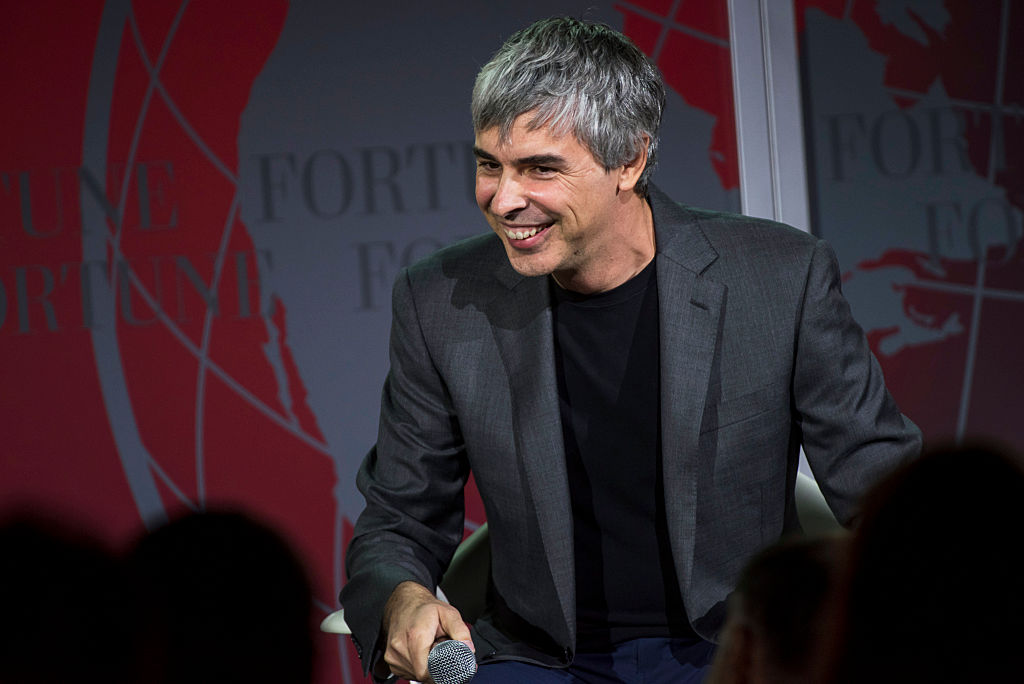What is Larry Page's net worth?
As one of the masterminds behind Google, what is Larry Page’s net worth?

Get the latest financial news, insights and expert analysis from our award-winning MoneyWeek team, to help you understand what really matters when it comes to your finances.
You are now subscribed
Your newsletter sign-up was successful
Want to add more newsletters?

Twice daily
MoneyWeek
Get the latest financial news, insights and expert analysis from our award-winning MoneyWeek team, to help you understand what really matters when it comes to your finances.

Four times a week
Look After My Bills
Sign up to our free money-saving newsletter, filled with the latest news and expert advice to help you find the best tips and deals for managing your bills. Start saving today!
Larry Page co-founded Google with Sergey Brin and is now one of the richest people in the world. Most of his wealth comes from his stake in Alphabet, which has a market capitalisation of $2.27 trillion.
According to the Bloomberg BIllionaire Index, Larry Page has a total net worth of $143 billion, making him the sixth wealthiest person, sitting close to Bill Gates and Larry Ellison on the billionaire rich list.
Here we look at how Larry Page built Google into one of the world’s most prominent tech companies and how it turned him into a billionaire in the process.
MoneyWeek
Subscribe to MoneyWeek today and get your first six magazine issues absolutely FREE

Sign up to Money Morning
Don't miss the latest investment and personal finances news, market analysis, plus money-saving tips with our free twice-daily newsletter
Don't miss the latest investment and personal finances news, market analysis, plus money-saving tips with our free twice-daily newsletter
Larry Page and Google
Larry Page and Sergey Brin met at Stanford University in the late 1990s. They decided to work together on a tool that would revolutionise the way people find information on the internet – what we now call a search engine.
While there were search engines at the time, many were poorly designed and had many flaws, making it hard to find the right information. Page and Brin set out to change that and build a tool that would be more efficient and accurate than other options available.
The Stanford students began by developing an algorithm that ranked web pages based on the number and quality of links pointing to them (a part of the ranking process that’s still used today). Initially, the founders named their search engine "Backrub" and tested it on the Stanford University website.
The results from the initial test were very positive, and Page and Brin set out to take the platform to a wider audience. They registered the domain name "Google.com" in 1997 and started working on the project full-time, setting up their first office in a garage in Menlo Park, California. The duo only hired a handful of employees to begin with and worked tirelessly to refine their algorithm with the overall goal of making Google the most effective search engine in the world.
In 1998, Google officially launched to "organise the world's information and make it universally accessible and useful," and it soon became the world’s go-to search engine. The name Google has even become synonymous with searching the web for information.
Over the years, Google has branched out, taking its position in search to build out other services, using its data to help refine products and improve the user experience. Its Gmail, Google Maps, Google Drive and YouTube products are used by hundreds of millions of people around the world every day.
Larry Page’s net worth booms as Google expands
In October 2015, Google announced that it was rebranding itself as Alphabet. The move was designed to restructure all of the group’s individual divisions under one umbrella, better reflecting the diversified nature of the enterprise. The search engine is still known as ‘Google.’
There were a couple of reasons behind the company’s decision.
First, Google had grown into a massive conglomerate of businesses and services. It had expanded into areas such as advertising, mobile operating systems, cloud services, artificial intelligence and more.
Artificial intelligence (AI) has also played a huge role in Google moving forward with technology and staying competitive. According to Fortune, the use of AI has added more than $18 billion to the co-founders’ combined wealth. As Google continued to grow, it became increasingly challenging to manage all of these different businesses under one umbrella.
Second, Google's founders, Larry Page and Sergey Brin found themselves spending more time managing the company and less time working on these ambitious projects – the reason they started the business in the first place. By creating Alphabet, Page and Brin hoped to give themselves more time to focus on these new ventures.
Third, Google has faced increasing regulatory scrutiny in recent years, particularly in Europe. By creating Alphabet, Google hoped to separate its core search and advertising business from its other ventures to make it easier for Alphabet (and the Google subsidiary) to avoid regulatory scrutiny.
It was also an opportunity for Google to shed some of the negative ideas that had developed around the company. It has faced plenty of criticism over the years around issues such as privacy, censorship and market control. By splitting itself apart, and showing regulators its divisions are all working independently, the group hoped to present itself as a more responsible and innovative company.
The future of Alphabet
Google’s transition to Alphabet marked the company's shift from a search engine to one of the world’s most influential technology businesses, which today is responsible for billions of hours of user content every day.
Plus, Alphabet now sits under the ‘magnificent seven stocks’ which is a group of the biggest tech companies. It includes Jeff Bezos’s Amazon and Mark Zuckerberg’s Meta – although Nvidia recently dethroned Microsoft to become the world’s most valuable company.
Despite the fact that Page and Brin have taken a step back from the daily management of Alphabet, they have a long-term goal in mind. Alphabet is allowing the founders to look to the future and follow their own interests, such as prolonging human life AI and self-driving vehicles.
Get the latest financial news, insights and expert analysis from our award-winning MoneyWeek team, to help you understand what really matters when it comes to your finances.
Jacob is an entrepreneur, hedge-fund expert and the founder and CEO of ValueWalk.
What started as a hobby in 2011 morphed into a well-known financial media empire focusing in particular on simplifying the opaque world of the hedge fund.
Before devoting all his time to ValueWalk, Jacob worked as an equity analyst specialising in mid- and small-cap stocks. Jacob also worked in business development for hedge funds.
He lives with his wife and five children in New Jersey.
Jacob only invests in broad-based ETFs and mutual funds to avoid any conflict of interest that could arise from buying individual stocks.
-
 Can mining stocks deliver golden gains?
Can mining stocks deliver golden gains?With gold and silver prices having outperformed the stock markets last year, mining stocks can be an effective, if volatile, means of gaining exposure
-
 8 ways the ‘sandwich generation’ can protect wealth
8 ways the ‘sandwich generation’ can protect wealthPeople squeezed between caring for ageing parents and adult children or younger grandchildren – known as the ‘sandwich generation’ – are at risk of neglecting their own financial planning. Here’s how to protect yourself and your loved ones’ wealth.


